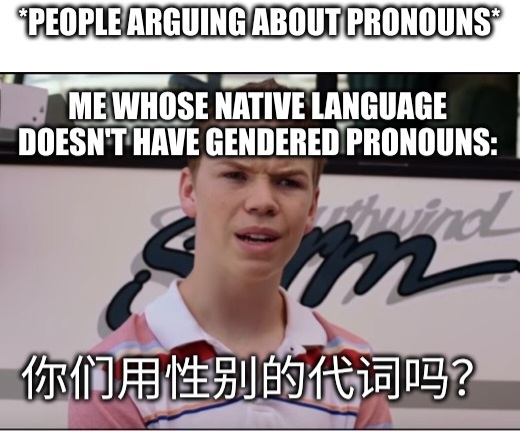this post was submitted on 30 Aug 2023
991 points (95.9% liked)
Memes
50658 readers
543 users here now
Rules:
- Be civil and nice.
- Try not to excessively repost, as a rule of thumb, wait at least 2 months to do it if you have to.
founded 6 years ago
MODERATORS
you are viewing a single comment's thread
view the rest of the comments
view the rest of the comments

Interestingly, written Chinese does have a gendered 'she' pronoun, 她, but it's pronounced the same as the male one, and it's a recent invention meant specifically to improve compatibility with Western languages.
Also, if you want a sample of how this works in English, the narrator / main character of Ann Leckie's "Ancillary" trilogy doesn't understand gendered pronouns and constantly gets them mixed up.
Except in that trilogy, in their language everyone's a "she". So, it's not like the narrator constantly flips back and forth between "he" and "she" randomly, it's just that the default is "she" when talking about a person, and the narrator has to make a real effort to use "he" when it's appropriate.
It's different following a story from someone who speaks a language without genders (say Chinese) or one with different rules about genders (Spanish). A Chinese person will often just use the wrong gender, and won't be consistent about it. What's really weird is that in Spanish the gender goes with the object being possessed, not with the possessor of the object. The third person pronouns don't have gender of their own, it's just "su" or "sus". So, "his house" is "la suya" because houses are female, her books are "los suyos" because books are male. That leads to all kinds of confusion over things like "his wife's friend" or "her brother's job" when trying to translate to English on the fly.
This is true today but for a while in the 20th century 伊 was used for "she"
And there's also 你 / 妳 that are used in some places or situations.